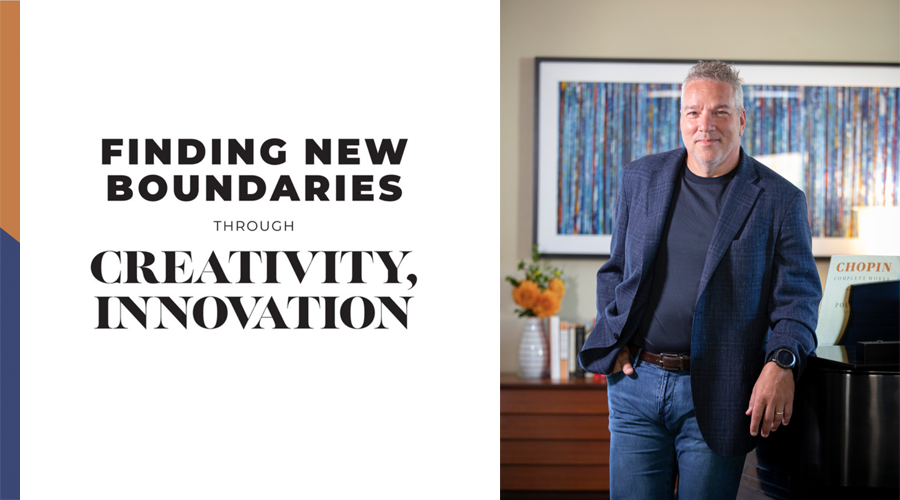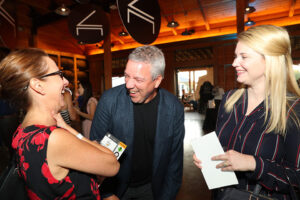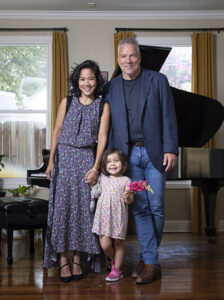
Jacques Marquis, who became the Cliburn’s president and CEO in 2013, started the Cliburn International Junior Piano Competition & Festival in 2015 and is introducing The Cliburn Agency and the Family Concert Series this fall.
Jacques Marquis Leads Cliburn’s Vision for Global Music Innovation
By Tori Couch
Photography by Ralph Lauer
After spending just a few minutes with Jacques Marquis inside his Crestwood home in Fort Worth, it’s clear music is important to the Cliburn’s president and CEO.
A Steinway piano, signed on the inside metal panel by the pianist Van Cliburn and Cliburn gold medalists who have visited Marquis’ home, greets guests in the entryway while a framed picture of the Cliburn’s iconic logo hangs behind it.
Marquis’ wife, Sandra Doan, and their 3-year-old daughter, Juliette, sing a sweet, heart-warming version of “Twinkle Twinkle Little Star” during a photo shoot. Juliette smiles and holds a pink flower.
Stepping inside the family room, a collection, or reserve as Marquis calls it, of whiskey and other spirits catches the eye. The dining room houses a wine fridge full of reds next to a cabinet overflowing with more.
“I’m on so many lists,” Marquis said, laughing, admitting he bought a lot of wine during the COVID-19 pandemic. “They have promotions all the time, and I’m like, oh, yes, they’re doing a promotion for me. I’m very, very sensitive to marketing.”
Marquis, his family and guests enjoy the spirits and wine in personal settings and work-related events at the house. Open spaces combined with a backyard pool and patio make it an ideal place for social gatherings.
Marquis’ friendly, engaging personality enhances those gatherings and has helped the Montreal native lead the Cliburn over the past 11 years.
Marquis became president and CEO in March 2013 after serving as interim executive director for almost seven months. Before that, he worked as the executive and artistic director at Jeunesses Musicales Canada in Montreal for a decade and helped establish the Montreal International Musical Competition.
Since arriving in Fort Worth, Marquis has implemented several new ideas that showcase the Cliburn on local and international stages. Those include starting The Cliburn Agency and Family Concert Series this fall, adding his personal, welcoming touch to the quadrennial Van Cliburn International Piano Competition, which will take place next summer, and starting the Cliburn International Junior Piano Competition & Festival in 2015.
The Cliburn’s goals remain the same as when it was founded and named after Cliburn in 1962 — bring classical music to a larger audience and help launch careers — but through a different lens.
“Let’s be creative,” Marquis said. “Let’s change the world through music and push all the boundaries. And I think the Cliburn can do that.”
The Cliburn Agency is the next step. Marquis had thought about creating a boutique agency supporting rising and established musicians for many years. COVID-19 gave the Cliburn the extra push needed to pursue the idea.
“We thought an agency could be interesting,” Marquis said. “The pandemic just confirmed that we should do that.”

The inside metal panel of the piano is signed by the Cliburn’s namesake Van Cliburn and Cliburn Competition gold medalists who have visited Jacques Marquis’ home.
During that time, several boutique agencies closed, leaving musical artists without a management company. Cliburn staff saw the effects of this while putting on the organization’s concert series and interacting with musicians who were booking their own concerts.
The Cliburn Agency will officially open in late September, and work with six to eight instrumentalist classical musicians seeking to magnify their careers through a relationship with the Cliburn.
The Cliburn’s artistic team selected agency soloists because of their dedication to producing quality music and desire to shape the music world in a unique way.
“All artists have some kind of point of view, but we’re looking for artists who have a definite point of view, who have a personal mission,” Doan, the Cliburn’s director of artistic planning for nearly 14 years, said.
The agency’s services include general management, concert booking, project management and publicity and branding services.
The Cliburn has offered career management services for years to the gold, silver and bronze medalists in each Cliburn Competition. Each medalist receives three years of assistance in areas like navigating social media, creating a website, interacting with donors and booking 75-100 concerts per year.
“What we’re doing with the competition is truly launching a career,” Maggie Estes, the Cliburn’s director of communications and digital content and a 14-year veteran of the organization, said. “So, we have to set them up from the very beginning.”
Agency musicians will receive a different level of guidance because their careers are more established, but everything can still be individualized.
Starting the agency required years of planning. Alissa Ford, the Cliburn’s chief financial officer for 12 years, said Marquis used a very methodical approach in evaluating the organization’s readiness for a new endeavor. His background in finance — Marquis earned a second degree in business administration after getting a bachelor’s in music with a focus in piano — helped.
This included researching other agencies, understanding agency structures, analyzing staffing needs and projecting revenue. The Cliburn’s current set up helped it “leapfrog” some steps, Ford said, but getting the green light still took time.
“We have to make sure we can logistically do this,” she said. “There’s a lot behind the scenes.”
An attentive approach extends to the creative side, too.
“It’s fun to get to work with artists and to hone in on their vision and feel like you’re a partner with what they’re trying to accomplish,” Doan said. “That’s going to be really amazing. It’s also a lot of responsibility. If you think about it, they’re sort of entrusting their livelihoods to you.”
The Cliburn’s other new venture this fall, the Family Concert Series, includes several concerts scheduled between September and February, with the first Sept. 14 at the Fort Worth Zoo’s Outdoor Learning Theater. Musicians will impersonate animals on different instruments and play Camille Saint-Saëns’ suite, “The Carnival of the Animals.”
Other concerts in the series include a holiday concert at the Fort Worth Stockyards Station Nov. 30 and Dec. 1 and a Voyager concert at the Fort Worth Museum of Science and History Feb. 22-23, 2025.
Marquis’ desire to try different things challenges the organization to innovate.
“I want to bring new ideas,” he said. “I want to renew myself. I want to bring new challenges.”
Estes said Marquis “empowers” department heads such as herself, Doan and Ford, while encouraging collaboration among the leadership.
Ford echoes this.
“There’s never a stagnant moment,” she said. “The organization feels very invigorated and interesting, and that’s because of who I think [Jacques’] leadership is and what he’s interested in.”
Even the organization’s flagship, the Cliburn Competition, has adopted a similar tone.
Pianist Anna Geniushene knew about the Cliburn Competition long before applying.
Growing up in Moscow, she viewed Van Cliburn as “superhuman.” Cliburn won the inaugural International Tchaikovsky Competition in 1958 and even visited the Moscow Tchaikovsky Conservatory when Geniushene studied there. Her friend Vadym Kholodenko then won the 2013 Cliburn Competition.
These lifelong connections came full circle when Geniushene applied for the 2022 competition, delayed one year by COVID, and discovered what separates the Cliburn from other international competitions.
“You just opened a new chapter in your life because you are welcomed and you are treated like a family member,” Geniushene, who won the silver medal in the 2022 competition, said.
That feeling lasted through the competition, a valuable gift for an expectant mother who gave birth to her second child in October 2022, less than four months after winning her medal. Geniushene, her husband and toddler son had also left Russia following its invasion of Ukraine in February 2022.
Upon arriving in Fort Worth, Geniushene met a host family who happened to be the same one that hosted Kholodenko.
Geniushene remembers her initial interaction with Marquis, which occurred during a meeting with the Cliburn’s artistic liaison. Marquis greeted her with his usual welcoming personality and asked why she changed her final round concerto selection moments before the application closed.
That recall made Geniushene smile. Weeks later, after winning her medal, they laughed about the interaction on stage.
“He’s so honest,” Geniushene said. “He’s so passionate about music, about what he is doing, and he really loves and adores the things that he’s doing. It becomes obvious to nearly everyone that he is just infusing the whole competition with his enthusiasm.”

Jacques Marquis engages with guests during an event hosted by the Cliburn.
Photo courtesy of the Cliburn
That, along with social events designed for the competitors, helps alleviate the cutthroat feel of competition. Even performing in front of an audience brings a lighter feel.
“There’s so much at stake every time they perform, and there are cameras everywhere, but when you feel that something’s happening on the stage, it feels good,” Doan said. “Then it’s not about the competition anymore. It’s about the performance.”
At its core, though, the competition focuses on finding pianists ready to enter the performance world as soloists. Assembling the jury that selects the three medalists is not something Marquis takes lightly.
International pianists who Marquis has met during his 30 years in music, make up the nine-person jury. He reaches out to potential jurors three years before a competition since their schedules fill up quickly.
Marquis likes having pianists as jurors because they know memory blanks or mistakes happen during a performance. So, those things alone will not eliminate a candidate from competition.
“I like to see a young pianist who’s courageous and fearless and within reason, but is willing to take chances,” Anne-Marie McDermott, a past juror, said. “Where their primary goal is communicating the music, not being perfect. We’re human.”
McDermott, Bravo! Vail Valley Music Festival’s artistic director, first served as a juror during the 2017 competition. She spent three weeks in Fort Worth judging pianists and became “dear friends” with Marquis, who asked her back for the 2022 competition.
McDermott enjoyed the experience and gained respect for the way Marquis led the jury.
“All nine of us are actively performing pianists, and, so, it’s a lot of big personalities in the room,” McDermott said. “Jacques just understands how to manage that as well. So, the jury really knows the rules. There have to be very strict, clear rules, and he’ll remind us a lot.”
Marquis visits other competitions for a fresh perspective and has made adjustments to the Cliburn Competition like changing the scoring, screening process and jury composition. One rule he instituted: jurors are not allowed to talk with each other about the competitors.
“I want them to vote separately, the nine jurors, as their own personal thought,” he said. “I said to them, ‘I don’t want a wine that is a blend. I want a unique merlot.’”
McDermott will participate in next year’s competition as a screening juror since Marquis frequently changes the jury composition. Screening jurors narrow the applicant pool to around 80 by watching audition tapes. In general, applications have increased every competition cycle with 388 in 2022. The 2025 application closes in October.
Selected applicants will visit Fort Worth March 16-22 for auditions with the screening jury. The top 30 will then take the stage at Bass Performance Hall, May 21-June 7, 2025, for the 17th Cliburn Competition.
Marquis’ jury selection approach has caught the attention of other international organizations, including International Violin Competition of Indianapolis’ Executive Director Glen Kwok. Kwok met Marquis over 10 years ago through the World Federation of International Music Competitions board.
Kwok noted that everything Marquis does centers on maintaining artistic integrity.
“Jacques has worked hard to always bring in a really first-rate and well-respected jury,” Kwok said.
Kwok and Marquis have exchanged countless ideas over the years even though their festivals focus on different instruments. They even jokingly argue over whose gift shop has the best pen or mug, Kwok says.
The goal of each discussion remains the same, though, as they seek to improve each competition.
“There is no reason in our business to reinvent the wheel, because someone has already done it,” Kwok said.
With the growth of technology, international music competitions are reaching a larger audience. In 2022, the Cliburn Competition’s three-week webcast garnered 10 million views. Viral videos and postcompetition viewership brought the total to 60 million. This is quite a jump from 2013’s half million views and five million views in 2017. Partnerships in Europe and Asia have aided the growth.
Not only does this help the Cliburn, but it benefits competitors as well. Geniushene said she found agents because of the webcast.

Music is a family affair for Jacques Marquis, wife Sandra Doan and their daughter, Juliette. Marquis and Doan work at the Cliburn while Juliette enjoys listening to pianists play at their home.
Like other medalists, Geniushene receives career management assistance from the Cliburn. She still has time left on a three-year contract, but expects the friendship they’ve built will last well beyond that timeframe.
“It’s something more deep, more profound and more personal,” Geniushene said. “I always feel that every time I’m in Fort Worth, I’m not a stranger in this city anymore.”
Marquis will oversee his 20th international competition next year. This count includes the 10-day Cliburn Junior Competition started under his watch in 2015. Marquis had noticed competitors’ ages were moving lower and wanted to help young artists prepare for their next steps.
Every four years, the Junior Competition welcomes 24 competing and 14 noncompeting pianists ages 13 to 17, equipping them for future pursuits through events like master classes and artists’ conversations.
Past junior competitors have participated in international competitions like the Chopin Competition, Cliburn Competition and Leeds International Piano Competition.
Marquis chose Dallas as the Junior Competition site, which is scheduled next for 2027. The idea received pushback originally from those worried about a potential decrease of the Cliburn’s stature in Fort Worth, but Marquis viewed Dallas as an untapped market.
“I was saying at one point, if I had the opportunity of starting a new series of concerts in New York, find the funding in New York and increase the awareness of the Cliburn in New York, what would you think?” Marquis said. “‘Oh, it’s great.’ I said Dallas is the same. It’s only half an hour away.”
The Cliburn has formed relationships with SMU, the Junior League of Dallas and Dallas Symphony Orchestra through the competition. Connecting the competition to the Cliburn brand means people’s attention will ultimately return to Fort Worth.
It ensures the young artists receive a high-quality experience, too.
“At one point, I judged the Cliburn Junior,” McDermott said. “And it was the same feeling there of [Jacques’] commitment to making sure these young pianists feel supported and loved and cherished so that they can be their best.”
Marquis finds time during the workweek to step away from the Cliburn and reconnect with his French-Canadian roots. At least once a week, except during competitions, he tries to play hockey and tennis. Marquis grew up playing both sports, but admits hockey takes precedence as a Canadian.
His professional hockey team allegiance lies with the Montreal Canadiens, but cheering for the Dallas Stars is acceptable once Montreal’s season ends, he said.
Marquis travels for work, and visits Montreal several times a year, where his daughter and two sons, ages 31, 28 and 25, and infant grandson reside.
Juliette keeps Marquis and everyone around her on their toes, fearlessly interacting with adults and asking questions. She understands French when Marquis speaks it, but mainly uses the language when she wants something sweet like chocolate. Music has already piqued Juliette’s interest, but Marquis hopes one day she gravitates toward tennis, too.
“Naturally, every time we have a pianist here, they play for her,” he said. “And she sits and she loves it.”
That love has clearly been handed down, something evident in Marquis’ work at the Cliburn. His internal drive quenches what Kwok calls a “thirst for innovation.”
The Cliburn Agency and Family Concert Series are some fruits of that “thirst.” This summer, the Cliburn also announced the Sessions concerts series is moving to Tannahill’s Tavern & Music Hall in the Fort Worth Stockyards for the 2024-25 season and recently received D CEO magazine’s Innovation in Education Award for its educational programming in elementary schools.
And all this is happening while preparing for the 2025 Cliburn Competition.
More innovations are surely in store with Marquis leading the way, finding inspiration around every corner.
“We nurture excellence, or we’re in the pursuit of excellence with these young kids,” Marquis said. “We get inspired by them and we help them to embrace something that is really, really difficult, which is a career in the arts.”
FAMILY CONCERT SERIES
The Cliburn is starting a new concert series this fall, which extends through next spring.
Carnival of the Animals
Date and times Sept. 14, 11 a.m. and 2 p.m.
Location Fort Worth Zoo’s Outdoor Learning Center
About:Musicians will impersonate animals on different instruments and play Camille Saint-Saëns’ suite, “The Carnival of the Animals.”
The Polar Express
Dates and times Nov. 30, 10:30 a.m. and 2:30 p.m.; Dec. 1, 2:30 p.m.
Location Fort Worth Stockyards Station
About The holiday concert will feature music accompanying narration and illustrations from Chris Van Allsburg’s “The Polar Express” book. A Cowboy Santa will be available for photos; the ice rink will be open; and other festive activities are included.
Voyager
Dates and times Feb. 22, 6 p.m.; Feb. 23, 11 a.m.
Location Fort Worth Museum of Science and History
About Journey through space and the Solar System inside the brand-new Jane & John Justin Foundation Omni Theater as images from NASA are displayed, accompanied by narration and music from piano, violin and cello.
